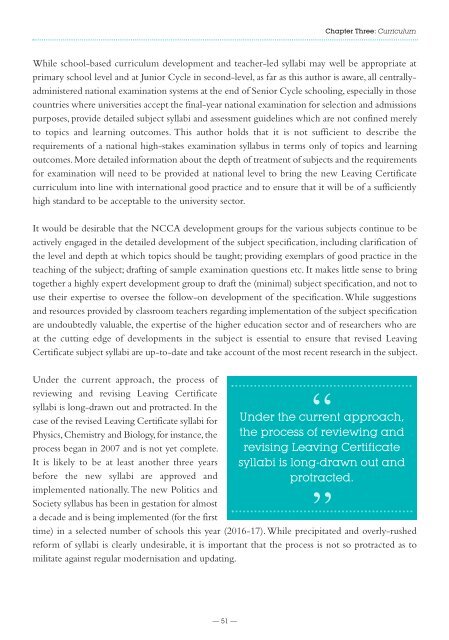Towards a Better Future
A Review of the Irish School System John Coolahan | Sheelagh Drudy Pádraig Hogan | Áine Hyland | Séamus McGuinness
A Review of the Irish School System
John Coolahan | Sheelagh Drudy Pádraig Hogan | Áine Hyland | Séamus McGuinness
Create successful ePaper yourself
Turn your PDF publications into a flip-book with our unique Google optimized e-Paper software.
Chapter Three: Curriculum<br />
While school-based curriculum development and teacher-led syllabi may well be appropriate at<br />
primary school level and at Junior Cycle in second-level, as far as this author is aware, all centrallyadministered<br />
national examination systems at the end of Senior Cycle schooling, especially in those<br />
countries where universities accept the final-year national examination for selection and admissions<br />
purposes, provide detailed subject syllabi and assessment guidelines which are not confined merely<br />
to topics and learning outcomes. This author holds that it is not sufficient to describe the<br />
requirements of a national high-stakes examination syllabus in terms only of topics and learning<br />
outcomes. More detailed information about the depth of treatment of subjects and the requirements<br />
for examination will need to be provided at national level to bring the new Leaving Certificate<br />
curriculum into line with international good practice and to ensure that it will be of a sufficiently<br />
high standard to be acceptable to the university sector.<br />
It would be desirable that the NCCA development groups for the various subjects continue to be<br />
actively engaged in the detailed development of the subject specification, including clarification of<br />
the level and depth at which topics should be taught; providing exemplars of good practice in the<br />
teaching of the subject; drafting of sample examination questions etc. It makes little sense to bring<br />
together a highly expert development group to draft the (minimal) subject specification, and not to<br />
use their expertise to oversee the follow-on development of the specification. While suggestions<br />
and resources provided by classroom teachers regarding implementation of the subject specification<br />
are undoubtedly valuable, the expertise of the higher education sector and of researchers who are<br />
at the cutting edge of developments in the subject is essential to ensure that revised Leaving<br />
Certificate subject syllabi are up-to-date and take account of the most recent research in the subject.<br />
Under the current approach, the process of<br />
reviewing and revising Leaving Certificate<br />
syllabi is long-drawn out and protracted. In the<br />
case of the revised Leaving Certificate syllabi for<br />
Physics, Chemistry and Biology, for instance, the<br />
process began in 2007 and is not yet complete.<br />
It is likely to be at least another three years<br />
before the new syllabi are approved and<br />
implemented nationally. The new Politics and<br />
Society syllabus has been in gestation for almost<br />
a decade and is being implemented (for the first<br />
“<br />
Under the current approach,<br />
the process of reviewing and<br />
revising Leaving Certificate<br />
syllabi is long-drawn out and<br />
protracted.<br />
”<br />
time) in a selected number of schools this year (2016-17). While precipitated and overly-rushed<br />
reform of syllabi is clearly undesirable, it is important that the process is not so protracted as to<br />
militate against regular modernisation and updating.<br />
— 51 —



